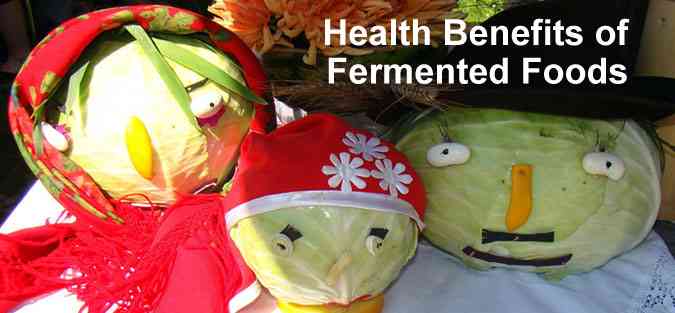Fermented Foods and their Health Benefits
By Krista DeKuyper | July 16, 2015 |

Introduction
It seems like there is no shortage of health-related studies being done these days. In fact, it can be difficult keeping up to date on the latest health news. However, sometimes there is something that is a no brainer as far as food choices and our health goes, and in this case we’re talking about fermented foods and their health benefits.
Fermented foods are a great source of vitamins and minerals, are full of probiotics and also act as chelators that detoxify your body!
What is Fermentation?
Fermentation is simply a process whereby bacteria and/or yeast converts carbohydrates into acids and/or alcohols.
Lacto-fermentation is a specific type of fermentation, and it is lacto-fermentation that is used to create pickles from cucumbers and sauerkraut from cabbage.
Lacto-fermentation involves bacteria that convert sugars into lactic acid. This lactic acid is a preservative, which is why fermented foods keep for so long.
Our Guts, Bacteria and Overall Health
Our guts (i.e. intestines) have literally trillions of bacteria that play a substantial role in our overall health.
These gut bacteria are called “gut flora”. (Note that you may run into another term, “microbiome”, which refers to the whole’s body’s bacteria/microbial content.)
In fact, gut bacteria affect1:
- The absorption of food energy and nutrients
- The immune structure and function
- Metabolic processes in general
- The occurrence of many diseases such as colon cancer and inflammatory bowel disease
Dr. Michael Snyder, the director of Stanford University’s Center for Genomics and Personalized Medicine, stated in 2014 that “There’s a good chance your microbiome is associated with every disease you can think of — diabetes, cancer, autism”2.
According to another source3 gut flora also affects:
- Our behavior (resulting in more risk-taking)
- Our genetic expression
- The occurrence of ADHD, learning disabilities and autism
- Occurrence of Type 2 diabetes
- And obesity
Benefits of Fermented Foods
Now that we have talked about the importance of gut flora, the next question might be “what does fermented food have to do with this”?
Well, turns out that fermented foods actually have plenty to do with healthy gut flora!
Here are just some of the health benefits of fermented foods:
- They contain high amounts of probiotics, which are beneficial bacteria and yeasts. This helps to correct your gut flora and optimize the immune system.
- Contain a wide variety of probiotics, especially when compared to probiotic supplements.
- Full of minerals and vitamins (e.g. vitamin K2 and the B vitamins).
- They are powerful, natural chelators. Chelators bind to heavy metal molecules in the body (e.g. aluminum, mercury, etc.) so that they can be passed as waste, thereby detoxifying your body.
- Fermented foods are often more cost effective as a probiotic source when compared to supplements.
Common Fermented Foods
Commonly eaten fermented foods are:
- Sauerkraut (fermented cabbage and salt)
- Yoghurt
- Tempeh (fermented soybeans)
- Kimchi (fermented cabbage that can be spicy)
- Kombucha (fermented sweet tea)
This list is far from complete since any vegetable can be fermented, as can any type of milk.
In fact, you can also ferment vegetables yourself very easily. By doing this yourself you insure your fermented foods have plenty of probiotics that haven’t been destroyed by pasteurization.
For instructions on how to ferment your own food this click here.
Not All Fermented Foods are Equal
Not all fermented foods have a large variety and amount of probiotics.
The number one way that the health benefits of fermented foods are destroyed is via pasteurization. When things are pasteurized they are boiled, and the boiling process kills off all the good probiotic bacteria.
Two fermented foods that often have their probiotics compromised by pasteurization are yoghurt and sauerkraut (pasteurization makes it easier to distribute).
Make sure you read the label on fermented foods. You also have the option of making your own fermented foods, which guarantees lots of probiotics!
Another thing to watch out for are foods that are pickled instead of fermented. “Pickling” refers to foods that have been preserved in an acidic substance (usually vinegar). Pickled foods created using vinegar DO NOT have the same amounts of probiotics compared to foods that have been fermented.
Conclusion
Fermented foods are a great way to get lots of healthy probiotics into your diet. Probiotics help to restore optimum microflora levels in your guts, thereby leading to better health.
In addition fermented foods have high nutrient levels and also act as chelators.
If you have any comments please leave them below, we welcome your feedback!
Sources:
1st Source http://www.webmd.com/digestive-disorders/news/20140820/your-gut-bacteria
2nd Source http://articles.mercola.com/fermented-foods.aspx






























